Part 1 - From ironclad defence to fluent attack
- Results and table
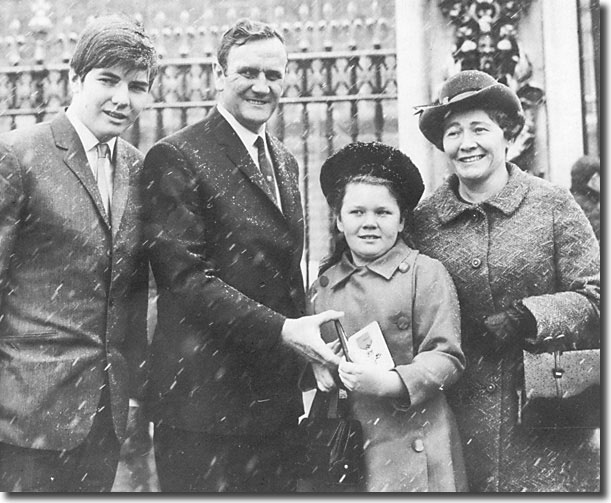
Leeds United began the new decade in the way they had spent the majority
of the Sixties: among the leaders in the title race. Their eleventh win
in fifteen games, against pace setters Everton on 27 December, left them
a single point shy of the Goodison club.
There was also personal recognition for manager
Don Revie, named in the New Year's Honours List. Accompanied by his
family, he travelled to Buckingham Palace to meet the Queen, who presented
him with an OBE for services to football.
Revie was as self-effacing as usual, saying, 'My award should be recognised
as a club rather than personal achievement.'
The first action of the year came with the third round of the FA Cup.
Revie was determined that Leeds should mount a successful campaign for
the trophy and refused to take lightly the challenge of Fourth Division
Swansea Town.
He was right to be cautious: United nearly came a cropper at the first
hurdle. Revie said later, 'I'd told the team all week that Swansea were
not going to be easy meat ... They have a number of more than useful players.
Then we went out like a team which had been thrown together. Eight of
the side seemed determined to show off their skills, and consequently
played like strangers.'
United were lackadaisical and complacent and the Swans took a shock lead
after 24 minutes. With United's defence in tatters, David Gwyther scored
from almost point blank range after Gary Sprake could only parry a shot
from Brian Evans.
There was little sign of an equaliser and it began to look like a major
upset was on the cards. United were unusually profligate in front of goal;
they were still trailing on the hour, when Fate took a hand.
Town captain Mel Nurse had played a commanding role in the Welsh rearguard,
but after tangling under a high ball with Allan Clarke, he lost his cool
and laid Clarke out. Referee Danny Corbett consulted a linesman before
dismissing the Welshman. Nurse claimed that Clarke had trodden on his
chest as they came down; he showed the press the stud marks after the
game.
From that moment United swamped Swansea with wave after wave of attacks.
After one assault, the referee ruled that right-back David Lawrence had
handled in the area. Lawrence protested his innocence in vain, and Giles
slid home the equaliser from the penalty spot.
Swansea continued to show resilience but Leeds got the winner with 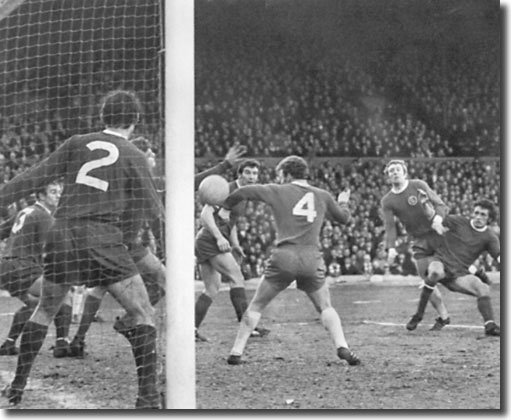 12
minutes remaining. From a corner Cooper swung a ball across the area and
Jones was unmarked as he nodded past keeper Millington. Even then, United
had to rely on a save from Sprake in the final minute to deny Evans.
12
minutes remaining. From a corner Cooper swung a ball across the area and
Jones was unmarked as he nodded past keeper Millington. Even then, United
had to rely on a save from Sprake in the final minute to deny Evans.
Swansea manager Roy Bentley was adamant that 'with Nurse on the field,
Leeds would not have scored in a month of Welsh Sundays'.
United were relieved to be through and they celebrated in style, turning
in one of the performances of the season
to thrash third-placed Chelsea 5-2 at Stamford Bridge.
A week later a routine 3-1 defeat of Coventry saw United resume leadership
of the title race as Everton capitulated by two goals to one at relegation-threatened
Southampton.
Richard Ulyatt in the Yorkshire Post: 'Saturday's match illustrated
how efficient and versatile Leeds are and it also showed how good a player
Clarke, the modern David Jack, is, particularly with an unselfish worker
of the calibre of Jones to shield him from the weight of opposing defenders.
Clarke scored the first and the last goals on Saturday and each time he
was so well positioned that he had only to divert a centre from the right
into goal.'
While Leeds were thrashing Sutton 6-0
in the FA Cup fourth round on 24 January, Everton played their game
in hand, dropping a point at home to Newcastle. The result left United
top by virtue of a superior goal average.
Sutton were disposed of with clinical efficiency, though amateur centre-half
John Faulkner was feted for his performance under fire. He said later:
'I got plenty of praise for the way I played against Mick Jones, but I
could scarcely have endeared myself to Leeds fans when I went on telly
after the game and ... ventured the opinion that I had played against
better centre-forwards ... I can see that the viewers must have thought
I was a real big headed so and so.'
It was reported soon afterwards that Second Division Hull City wanted
Jack Charlton as their new manager.
Charlton: 'They apparently had the idea that I was over the hill as a
first teamer and got in touch with the Boss to see what the chances were
... As ever, the Boss was quite open about it. He called me into his office
and told me all about the opportunities and even pointed out that they
were great chances to secure the future for the wife and family. To be
quite honest, I thought at the time that he was trying to get rid of me
and let me down lightly. And it was not without a certain amount of apprehension
that I popped the question, "What's the alternative if I turn them
down?"
'And when he answered, "You can have another couple of years' contract
on the same terms as you are getting now and then we will see about giving
you every help to get a good grounding on the managerial side," I
could have jumped for joy.'
Nevertheless, Charlton, almost 35, was in the latter days of a lengthy
career and at the beginning of March, John Faulkner signed for United
despite rival interest from Arsenal and Spurs. Revie had been chasing
him ever since the Cup game.
After victory at Sutton, Leeds drew 2-2 at Old Trafford on the Monday
night, and then 1-1 at Stoke, while Everton were beating Wolves 1-0 at
home; the two clubs were once again divided only by goal average.
On 7 February, Leeds cruised into the sixth round of the Cup by beating
Mansfield 2-0. With Paul Madeley out injured, this game was the first
occasion on which the most famous United line-up of all was on duty: Sprake,
Reaney, Cooper, Bremner, Charlton, Hunter, Lorimer, Clarke, Jones, Giles,
Gray. Contrary to popular opinion, that eleven very rarely played together,
thanks mainly to the consistency over the years of Madeley.
back to top
Leeds followed on by crushing West Bromwich Albion 5-1 and moved two
points clear of Everton. Both clubs drew on 14 February, though United's
was the better result, 1-1 at Tottenham, while Everton were at home to
Arsenal. The Goodison men dropped another home point in a scoreless match
with Coventry while Leeds were progressing into the last four of the Cup
with a 2-0 victory at Swindon on 21 February.
The Wiltshire club, who beat Arsenal to win the League Cup in 1969, were
expected to be tricky opponents, but they never got going. Leeds took
a grip in midfield and Clarke applied the killer blows, scoring twice
in as many minutes around the half hour.
| |
Top of First Division - 28 February 1970 |
| |
Pos
|
|
P
|
W
|
D
|
L
|
F
|
A
|
Pts
|
| |
1st
|
Leeds
United |
34
|
19
|
13
|
2
|
73
|
32
|
51
|
| |
2nd
|
Everton |
33
|
21
|
7
|
5
|
55
|
29
|
49
|
| |
3rd
|
Chelsea |
32
|
15
|
12
|
5
|
54
|
34
|
42
|
| |
4th
|
Derby
County |
34
|
16
|
7
|
11
|
46
|
32
|
39
|
| |
5th
|
Wolverhampton
W |
34
|
12
|
14
|
8
|
50
|
43
|
38
|
| |
6th
|
Manchester
United |
33
|
12
|
14
|
7
|
47
|
43
|
38
|
February ended with United beating Crystal Palace 2-0 and Everton playing
out a third successive draw to leave the Whites in pole position. However,
Leeds were soon to become the victims of fearsome fixture congestion.
United were paired with Standard Liege in the European Cup quarter finals;
Liege had pushed them hard in the Fairs Cup in 1968, when it had taken
second half goals by Charlton, Lorimer
and Bremner to overturn a 2-0 deficit at Elland Road.
Albert Barham reported on the first leg in Belgium for The Guardian:
'As they had fully expected, this tie at Sclessin Stadium was the hardest
physical battle they have had in the European Cup. But Leeds rode the
rough tackling without complaint - they too can play as physically hard
as any side ... It looked for so long as though they were going to rue
the three great chances they had in the first half.
'It was by no means all attack from Leeds. This Standard side, littered
with internationals, are expert at counter attacking and Semmeling and
Takac on the wings swept forward dangerously to get behind the Leeds defence.
But no one could say that any member of the magnificent Leeds side was
wanting in ability. Every man played to the limit of his ability on a
heavy pitch that cut up badly. So concerned were the Standard officials
regarding the pitch that earlier today they had used a helicopter hovering
over the ground, fanning it with the blades, trying to dry it out.
'The goal that beat Standard - first time they have lost here since early
last season - came after 71 minutes. It was begun by Madeley and Clarke;
Cooper took on Clarke's little nodded pass and swung the ball high to
the goalmouth. It sailed over Thissen and there was Lorimer to hammer
it in.
'Leeds cleverly slowed down the pace when Standard tried hard to come
forward, but after this crucial goal, Leeds went back on defence, partly
to conserve their advantage and partly because of the venom of the Standard
attack. It was in those last few minutes that Cooper stopped the ball
on the line and allowed Sprake to gather it in a scramble.'
Back on English soil, Saturday, 7 March, brought a stern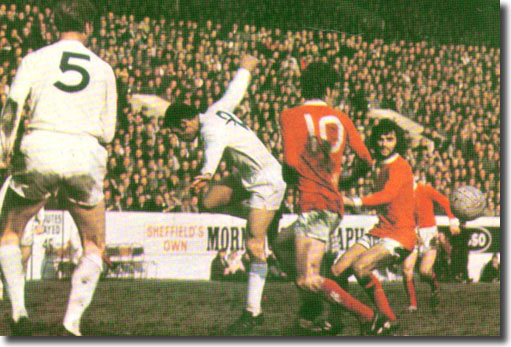 test at Liverpool, while Everton visited Burnley. The Goodison men won
2-1, but Leeds had to be content with a goalless draw. The game turned
on two controversial incidents. United were relieved when referee Leo
Callaghan rejected penalty appeals after Cooper appeared to handle, but
were unhappy when the official blew for full time seconds before Madeley
got the ball in the net. The referee allowed no injury time despite at
least two lengthy stoppages.
test at Liverpool, while Everton visited Burnley. The Goodison men won
2-1, but Leeds had to be content with a goalless draw. The game turned
on two controversial incidents. United were relieved when referee Leo
Callaghan rejected penalty appeals after Cooper appeared to handle, but
were unhappy when the official blew for full time seconds before Madeley
got the ball in the net. The referee allowed no injury time despite at
least two lengthy stoppages.
The draw kept United a point clear of Everton, but the positions were
soon reversed. The Merseysiders won a rearranged match at Tottenham during
the week by a single goal and then moved further ahead by beating the
same Spurs team 3-2 at Goodison. Over at Hillsborough Leeds were facing
Manchester United in a titanic FA Cup semi-final.
Neither side could manage a goal, resulting in an unwelcome replay for
United. Geoffrey Green in The Times: 'The Leeds approach ... was
bleak, certainly circumspect, like some cautious boxer guarding against
a quick knock out and relying rather on stamina and mounting strength
to win over the last stages. Manchester called the tune for that opening
three quarters of an hour and could twice have taken the lead.
'After only 15 minutes of swift, one-two touch moves between Sartori,
Charlton and Kidd, Sartori glided clear to the six-yard line, opposed
only by Sprake, and stabbed his shot past an inviting target. Just short
of the interval a long throw in by Edwards was headed on by the loping
Crerand - dictating the midfield rhythm - for Kidd to nod down and Best,
on a quicksilver pirouette, flashed his close-range half volley inches
wide. Each time Sprake was helpless and Leeds, like a bridge player, vulnerable.'
United were in action again on Wednesday, 18 March, completing the job
against Standard Liege at Elland Road. They struggled all night for the
goal that would see off their opponents and had to wait for a Giles penalty
13 minutes from time to settle jangling nerves.
The United defence struggled to cope with the visitors' attack, prompted
expertly by Van Moer, and there was nearly a goal at the start of the
second half. Depireux collected the ball and turned to fire in a great
shot, which Galic deflected; it required Sprake and Reaney in combination
to turn it aside for a corner. But Leeds were now playing with the wind
and they seized control. Jones had a header well saved and then he was
brought down as he ran in on goal. Referee Concetto Lo Bello awarded the
penalty and Giles calmly put the ball away to settle the contest.
back to top
Don Revie was relieved to win but perturbed by the knee injury which
saw Norman Hunter sidelined for more than three weeks.
Honours were even between Everton and Leeds at the weekend, the former
winning 2-0 at Anfield while United beat Wolves 2-1. Everton could then
rest, but Leeds were back in FA Cup action against Manchester United on
the Monday night at Villa Park.
It was an evening of high excitement, but no goals, meaning a second
replay.
Geoffrey Green reported for The Times: 'Though the night at the
finish denied us a goal, what a tremendous battle of wills, temperament,
stamina and skill was this in punishing conditions. After hours of rain
and a steady downpour up till half time, the pitch began like a glistening
sheet and soon became a quagmire. Even Sir Walter Raleigh would have thought
twice about laying down his cloak for anyone. To add to it all too there
now came a cold swirling wind to add another hazard to this truly titanic
struggle. From first to last it was tight, tense and terrific with Manchester
beginning with a majestic flourish and winning the night on points, but
Leeds absorbing all the pressure hurled at them like a steel suspension
bridge.
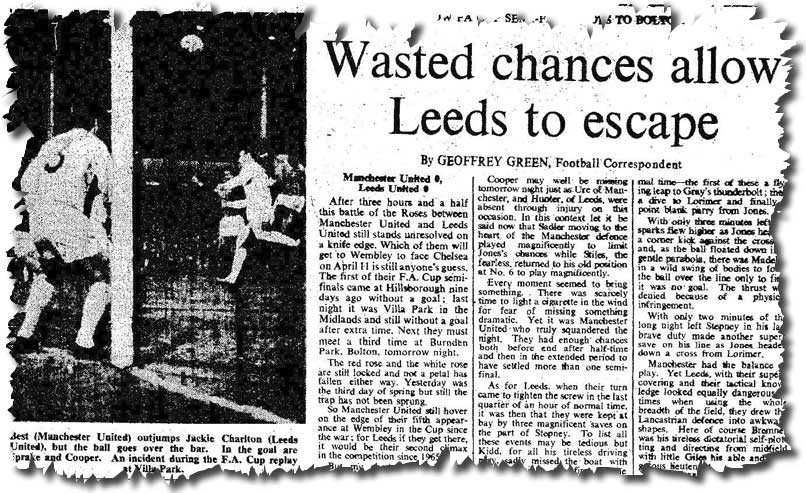 'There
was no quarter anywhere and by the time the extra half hour had arrived
exhaustion and cramp were clearly making themselves felt. Law taking the
dark battlefield as substitute for Sartori who had run himself into the
ground - this six minutes into the extra period. Leeds followed suit with
Bates for Cooper who was carried away on a stretcher with 10 minutes still
left. Cooper may well be missing tomorrow night just as Ure of Manchester,
and Hunter of Leeds, were absent through injury on this occasion.
'There
was no quarter anywhere and by the time the extra half hour had arrived
exhaustion and cramp were clearly making themselves felt. Law taking the
dark battlefield as substitute for Sartori who had run himself into the
ground - this six minutes into the extra period. Leeds followed suit with
Bates for Cooper who was carried away on a stretcher with 10 minutes still
left. Cooper may well be missing tomorrow night just as Ure of Manchester,
and Hunter of Leeds, were absent through injury on this occasion.
'Every moment seemed to bring something. There was scarcely time to light
a cigarette in the wind for fear of missing something dramatic. Yet it
was Manchester United who truly squandered the night. They had enough
chances both before and after half time and then in the extended period
to have settled more than one semi-final.
'To list all these events may be tedious but Kidd, for all his tireless
driving play, sadly missed the boat with three openings, the first in
the opening minute. Then came two of the biggest sitters of all wasted
by Law, first with his head at point blank range to Charlton's cross and
only a moment after he had come on as substitute in the extra half hour
and later, with only three minutes left, when he stabbed the ball from
five yards range straight at Sprake with all glory awaiting him. He could
have been king at either of those moments.
'Best, also, closely covered all night by Reaney, once broke free brilliantly
in the second half of extra time, swerving both ways with close footwork
in a thick slime - a marvellous piece of magic - he certainly was in the
open with some 45 yards ahead of him and only Sprake left. He was going
like the wind but the mud beat him as he lost control in this helter skelter,
trod on the ball and flew through the glue flat on his face.
back to top
'It was all highly dramatic, intensified as Leeds, piling on the pressure
in a counter offensive, brought three magnificent saves from Stepney in
the last quarter hour of normal time - the first of these a flying leap
to Gray's thunderbolt; then a dive to Lorimer and finally a point blank
parry from Jones. With only three minutes left the sparks flew higher
as Jones headed a corner kick against the crossbar and, as the ball floated
down in a gentle parabola, there was Madeley in a wild swing of bodies
to force the ball over the line only to find it was no goal. The thrust
was denied because of a physical infringement. With only two minutes of
the long night left Stepney in his last brave duty made another superb
save on his line as Jones headed down a cross from Lorimer.'
The marathon semi-final continued on Thursday 26 March at Burnden Park,
Bolton; just as in 1965 when the two clubs met at the same stage, the
difference between them was Billy Bremner, announced the previous day
as a hugely worthy Footballer of the Year.
Phil Brown reported the game for the Evening Post: 'Leeds ...
put Manchester out by substantially more than the 1-0 score suggests,
indeed they won like great champions - with something in hand. They took
the often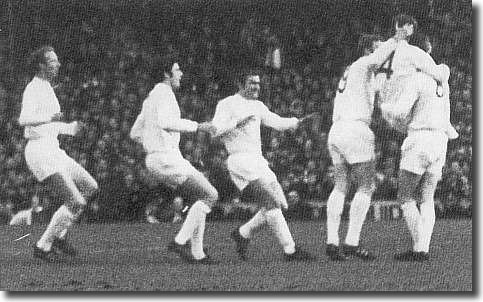 excellent best that Manchester could offer in their stride. Bremner sent
Manchester reeling with an eighth-minute goal and followed it with the
game of his life and he had had many a star game. His team responded to
a man. I have never seen a fine side, as Manchester have been this season
in five games against the champions, so taken apart by an even better
team. To watch a team with as many star players as Manchester have - five
of them are in the World Cup squad - so held in attack and sent so helter
skelter back in desperate defence was an experience.
excellent best that Manchester could offer in their stride. Bremner sent
Manchester reeling with an eighth-minute goal and followed it with the
game of his life and he had had many a star game. His team responded to
a man. I have never seen a fine side, as Manchester have been this season
in five games against the champions, so taken apart by an even better
team. To watch a team with as many star players as Manchester have - five
of them are in the World Cup squad - so held in attack and sent so helter
skelter back in desperate defence was an experience.
'Billy Bremner was in a class by himself. He steadied Leeds through Manchester's
opening burst, played at a great pace in the best conditions that at least
Leeds have had for months, inspired the counter attacks and scored his
thunderbolt goal. Flying up among his forwards, he met a header by Clarke
off a centre by Lorimer and shot first time at top speed from 17 yards.
Some yawing in the Manchester defence had left a shooting gap, but there
was still Stepney, a fine keeper as he has played against Leeds, to beat.
I doubt if Stepney saw the shot. He certainly had no time to move as it
whizzed across.
'When Manchester tried to force or scheme a way into United's box (Bremner)
took on Bobby Charlton, Kidd, Best, Sartori, Morgan and Crerand as they
came his way ... Then in the last tenminutes, when he should have run
out of the last particle of steam, he raced half the length of the field
twice, cracking Manchester's defence like cheap glass. He finally just
missed scoring again with a tremendous straight shot which Stepney only
just pushed over the bar.
'Manchester's stars were snuffed out by the perfectly positioning, anticipating
and moving of the Leeds defence, which reduced Best to futility, blocked
off Bobby Charlton and never let talented and burly Kidd make the breakthrough
his side needed. Cooper tamed all Morgan's tricks and the wing running
of the match ... was done by Cooper and Lorimer. Madeley replaced Hunter
perfectly, better than at Villa Park, and was a main reason for the bottling
of the Manchester attack. Revie is the envy of every manager in having
him.
'The referee, Mr Jack Taylor, did well again. He has been in his solid
way just the man for these three memorable matches. We who saw all three
will always remember them - the effort and tension in the mud at Hillsborough,
the sheer brilliance in the rain at Villa Park and the perfect demonstration
of how to win a semi-final we saw at Bolton.'
Billy Bremner: 'The main reason behind that win was that the Boss decided
to get Reaney and Madeley to play their normal games. In the previous
ties, they had the specific job of shadowing George Best and Bobby Charlton,
and this tended to unsettle our defence. The fact that Reaney followed
Best wherever he went meant that he was leaving behind gaps which the
other United forwards exploited. The Boss said: "I've never seen
a team create so many chances against Leeds as Manchester United have
done. Let's revert back to our normal style of play, and let them worry
about us for a change."
'Johnny Giles sent the ball winging out of defence, and a chip from Peter
Lorimer helped it on its way, right into Manchester United territory.
Allan Clarke leaped high to connect with his head, as Nobby Stiles moved
across to try to cover. The ball came down and cannoned off the legs of
Mick Jones straight through to me. I didn't need a formal invitation -
I swung at the ball and blasted it through space with my left foot.'
Despite the joy of victory, the semi-final marathon had stretched United
to breaking point: Bremner (groin), Giles (calf), Reaney (thigh), Jones
(ankle) and Cooper (shin and leg) were all out of the weekend's game against
Southampton. Revie summoned Bates, Belfitt,
Hibbitt, Yorath and Davey
from his reserve strength with Lumsden named as sub.
United had the better of the first hour, taking the lead after 63 minutes
through Lorimer. But the final twenty minutes brought disaster.
In the 71st minute Charlton miskicked a Southampton corner through his
own goal. Six minutes later Hibbitt handled and Ron Davies put the Saints
ahead from the spot. With three minutes left, Mike Channon chipped Sprake
from almost on the goal line and Yorath, trying to turn the ball away,
conceded the third goal.
back to top
With Everton hammering Chelsea 5-2, Don Revie had some hard thinking
to do. United had secured a place at Wembley and a European Cup showdown
with Celtic; in the league, they were five points behind Everton with
five games to play, one more than the Merseysiders. Even if Leeds won
the lot they would still have to rely on 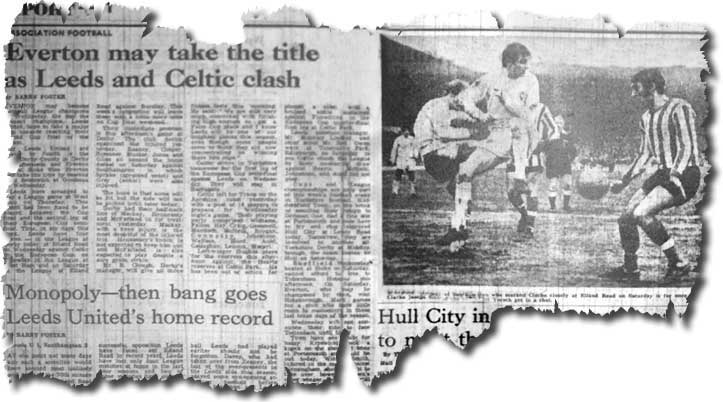 Everton
dropping three points.
Everton
dropping three points.
Revie reasoned that to continue going flat out for three trophies was
folly. Prompted by urgent warnings from the club doctor that some of his
men were near exhaustion, he decided to throw in the challenge for the
title.
When United came out at the Baseball Ground to face Derby County on 30
March, not a single first team regular was in the selection, which read:
Harvey, Davey, Peterson, Lumsden,
Kennedy, Yorath, Galvin, Bates,
Belfitt, Hibbitt, Johanneson.
There was little surprise when a decent Derby side ran out 4-1 winners.
Revie said afterwards, 'What is the point of employing the services of
a fully qualified medical officer if you don't take his advice? Our doctor
declared that the players concerned were thoroughly tired, mentally and
physically, and that if they carried on there was no knowing what damage
might be caused. So we had no alternative but to take the steps we did.
After all, the health of the players must be the first consideration of
any club.
'By the end of the second replay at Bolton, the strain was obvious, and
the doctor expressed his views, which we accepted. But it is quite wrong
to say that we took a dive and wittingly sent out a weakened side ...
If similar circumstances arose again I should do exactly the same thing.
I think most people understand our predicament, and I imagine that quite
a few clubs would have done the same thing in our position.'
Bert Head, manager of struggling Crystal Palace, was furious that relegation
rivals had been advantaged: 'I was angry to see they had pulled six out
of the team for a match equally important to the relegation battle, and
I think Leeds should remember that others are involved in different League
battles, and those two points considerably help Southampton.'
Football League regulations stated, 'each club shall play its full strength
in all league matches, unless some satisfactory reason is given.' The
League imposed a fine of £5,000. President Len Shipman: 'We took into
consideration all their problems, and felt sorry for them, and it took
us more than an hour to reach our decision because we were conscious that
they 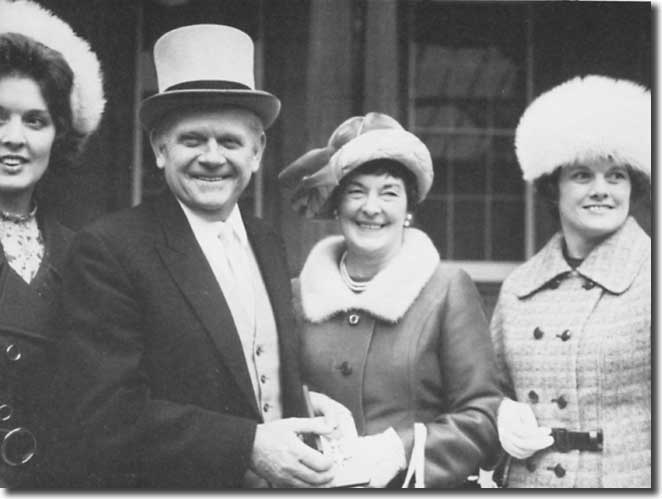 were
struggling especially hard as the season had been shortened. But it must
always be borne in mind that the League can, after all, forbid clubs to
take part in European competitions if they cannot fulfil commitments at
home.'
were
struggling especially hard as the season had been shortened. But it must
always be borne in mind that the League can, after all, forbid clubs to
take part in European competitions if they cannot fulfil commitments at
home.'
back to top
Andrew Mourant: 'Revie incurred, not for the first time, the displeasure
of Football League secretary Alan Hardaker.
Over the previous two years, Hardaker had tired of Revie's requests for
fixture rearrangements and postponements that might put Leeds at an advantage.
In football matters Revie was, in Hardaker's opinion, devious, selfish
and ruthless, and would cut corners to get his own way. Revie had offended
Hardaker the previous season by an oblique approach to the League secretary's
subordinates, with the aim of bringing forward by 24 hours a League Cup-tie
against Bristol City. It was the impropriety of Revie seeking to involve
his juniors that had made Hardaker especially indignant ... According
to Hardaker, part of Revie's fixture pile-up was of his own making; earlier
in the season, he had had fixtures put off.'
The mood at Elland Road was scarcely up beat when, two days after the
Derby game, Celtic arrived for the first
leg of the European Cup semi-final.
Don Revie hoped to earn a two-goal lead, but those hopes were dashed
within ninety seconds of kick off. A long ball downfield was misjudged
by Madeley and in the scramble that followed George Connelly's shot was
deflected in by Cooper.
United never got the shock out of their system. They played poorly and
lost 1-0; according to Phil Brown of the Evening Post, 'the elastic
had gone.'
That same evening, Everton formalised their championship with a routine
2-0 victory at home to West Bromwich Albion.
The next day Leeds played out a meaningless match at West Ham. Revie's
reward for naming a number of first-teamers was a broken leg for Paul
Reaney. The injury ruled one of United's most consistent performers out
not only for their own run-in but also England's defence of the World
Cup.
Leeds were 2-1 down when Reaney was injured at the start of the second
half and had already used substitute Terry Hibbitt, so had to play out
the game with ten men. It was enough to make grown men weep, but United
fought back to earn a draw when Clarke netted his second goal of the game
with 14 minutes remaining.
Reaney: 'I never saw the boy ... but you can't blame him. He has no reason
to feel bad about it, for it is one of the things one has to accept in
football ... I never saw the player concerned, but I knew instinctively
I'd done it. I just lay there still, unmoving. Gary Sprake rushed from
his goal and other players surrounded me. Everything was there, but now
it has gone.'
Sir Alf Ramsey chose Paul Madeley as Reaney's World Cup replacement,
but the utility man decided not to accept. He later said, 'I reckoned
that if I were not among the original 40, I was extremely unlikely to
get a game if I did go to Mexico, and that's a long, long way to go for
nothing. There was another reason for my deciding not to go ... By the
time the League season was over I could well have played in more than
60 games for Leeds ... I had just completed a spell of eight games in
18 days. Mentally and physically, I was feeling whacked.'
Two days later Leeds played their 58th game of the season, at home to
Burnley. Only Madeley, Gray and Lorimer of the recognised first-team were
on duty with John Faulkner on debut and Albert Johanneson at centre-forward.
The game has become legendary for the two extraordinary goals scored by
Eddie Gray.
The first, in the tenth minute, was an opportunist effort after a Burnley
defender nodded away a centre from Galvin. Gray secured the ball 35 yards
out and saw goalkeeper Peter Mellor on his six-yard line. He set his sights
and chipped goalwards. The ball cleared Mellor and dropped precisely under
the crossbar, a masterly piece of accuracy and skill.
Burnley equalised after 26 minutes when Faulkner misjudged a shot from
Probert and sent it into his own net - not the way he would have chosen
to mark his first appearance.
back to top
After 71 minutes, Gray wrapped up the win with an even more remarkable
effort, one that ranks amongst the finest goals ever scored by a United
man.
With Johanneson lying injured a yard inside the penalty area, Gray got
possession 20 yards from goal and flicked the ball down the left hand
edge of the box. He caught it on the byline and turned to face two Burnley
defenders. Dragging it away from both of them he made his way back into
the box. Johanneson was still prone, and his presence left Gray with little
scope. There was no other man available for the pass and Gray continued
his tricks inside the box, back and forth, dragging the ball back and
then slipping it wide as he left defender after defender looking foolish.
Just as it seemed he would try one trick too many, he struck a low shot
inside Mellor at the near post to register a quite extraordinary goal.
It was a spectacular and memorable effort by a man at the peak of his
game.
Don Revie: 'The goal was one of the best I've seen since Eddie scored
in an international youth tournament in 1966. He beat eight men then.
Today he 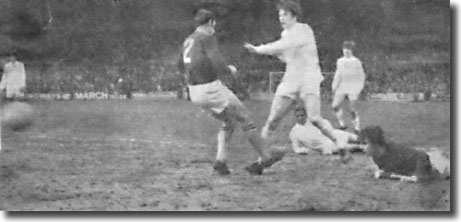 only
beat six.'
only
beat six.'
Gray displayed the same form in the following week's FA
Cup final against Chelsea, torturing David Webb with a masterclass
in wing play. Leeds were absolutely dominant, hitting the woodwork on
three occasions. Twice they took the lead, but Chelsea twice came back
to equalise.
Andrew Mourant: 'The club seemed to summon from nowhere its old vim.
Revie's side achieved everything but victory. On a heavily sanded pitch
that caused some strange bounces of the ball, Leeds produced their stylish,
muscular football once again. Told by Revie to go out and play, they responded
with one of the best post-war exhibitions of football Wembley had seen.
Eddie Gray unfurled a performance of tormenting skill on the left wing,
reducing Chelsea right-back David Webb to impotence. Other Chelsea defenders
floundered in spaces where Leeds men had been.'
It was an absolute travesty that United did not win at a canter - they
had played as well as they had done for weeks, but it was just not their
day.
Don Revie: 'In 1965 and 1968 we did not do ourselves justice at Wembley.
I asked our players to go out there and give a really special display,
to go out and prove to everybody in Britain what a great side they are,
and they did me proud. I have never seen them play better.'
The United party had little time to brood on what might have been, for,
as the newspaper headlines were proclaiming the need for a first Cup final
replay since 1912, Don Revie was leading his men up to Scotland for the
second leg of their European Cup semi-final.
They were very much up against it, burdened by Celtic's 1-0 victory in
the home leg, but took a first half lead when Billy Bremner sent in a
long-range screamer.
United managed to retain the advantage for the rest of the half, but
were rocked after the break when Hughes nodded Celtic level from a corner.
Shortly afterwards Gary Sprake was stretchered off after a clash with
Hughes and then Murdoch put a second goal past substitute keeper David
Harvey.
That took the wind out of United and they never really hinted at turning
the game round, losing 2-1 on the night and 3-1 on aggregate.
Don Revie: 'That was a bitter pill to swallow - but I like to think,
and I do believe, that we at Leeds took our knock out in the right spirit.
We congratulated Celtic, and we meant it, when we said we hoped they would
bring the trophy back to Britain.
'I wasn't really feeling like receiving visitors, though, just before
we left Glasgow for home ... It was a surprise to me when a local minister
called in to wish us all the best for the replay against Chelsea. But
when he told me that he intended to point to my example in his Sunday
sermon, I just had to smile.
'The minister, it seemed, had been impressed by my attitude in defeat;
by the way I had taken the disappointment of the past few weeks seemingly
in my stride. He was basing his sermon on my attitude, "as a model
of how to accept life's disappointments". He was sincere when he
said this ... and yet, I had to smile. No one had seen me, tossing and
turning during the night, as I went through the game, and the despair
of that defeat. And I told him, "Don't let it fool you. It's all
on the surface. Inside, I'm sick." And I was.
'But if I was sick, I was also proud - proud of the Leeds United players
who had given all ... and were prepared to go on giving all, so long as
there was something left to fight for.
'Celtic were much too good for us over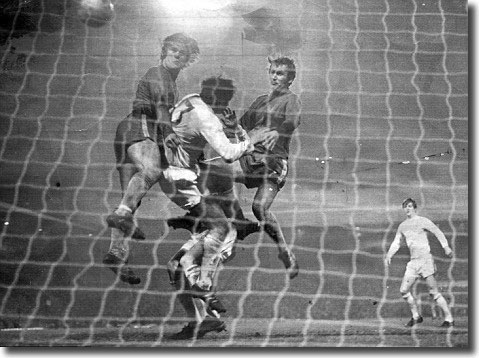 those two matches, but I'll never stop wondering what the result might
have been had we been fresher.'
those two matches, but I'll never stop wondering what the result might
have been had we been fresher.'
back to top
Over the next couple of weeks the league campaign ended with shadow selections
losing to Manchester City and Ipswich. Against City, John Faulkner fractured
a knee cap, another forlorn moment in a season that was threatening to
blow up in the club's face.
Still they had the FA Cup to aim for and were favourites when they faced
Chelsea in the Old Trafford replay on
the evening of 29 April.
Chelsea manager Dave Sexton laid out plans to prevent Eddie Gray repeating
his Wembley wonder show, detailing Chopper Harris to kick the Scot out
of the contest.
United again dominated the game and secured a first half lead with a
Mick Jones strike from the edge of the box. But lack of concentration
allowed Peter Osgood to ghost through the defence and nod home a second
half equaliser. United continued to press but could not snatch a second
goal, and the match went to extra time.
David Webb, Wembley's hapless victim, turned match winner when he bundled
home a goal from a long throw by Ian Hutchinson.
It was heart breaking for Leeds, but they threw men forward in reckless
pursuit of an equaliser. Try as they might they could not get back on
terms.
It had been the most valiant pursuit of the treble, but in the end it
was too much. In setting his sights on the most ambitious of outcomes,
Don Revie had spread his strength too thinly.
Geoffrey Green in The Times: 'It has been a strenuous slog, greatly
pressurised by the loss of a month because of the demands of Mexican acclimatisation
for England's players in the World Cup. None have suffered more than Leeds
United's players ... At the beginning of March, Leeds looked capable of
winning everything and anything, including the General Election. At that
time they seemed unbeatable, but in the end a condensed programme of highly
competitive fixtures overwhelmed them.
'Should it be any consolation to them, Leeds have now probably won something
more in defeat as good losers than they would have done in many hours
of victorious celebrating - universal 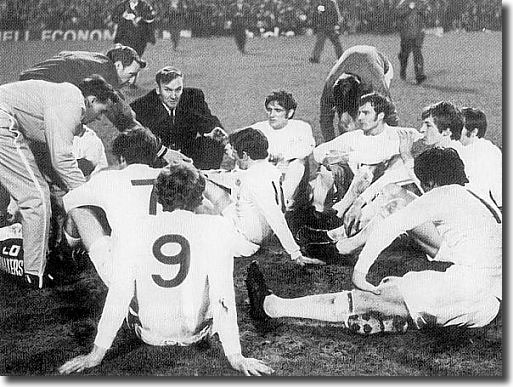 public
sympathy.'
public
sympathy.'
Liverpool manager Bill Shankly: 'Few people realise how big a blow Leeds
suffered when they lost Reaney. His absence upset the whole rhythm and
balance of the side ... Madeley should have been kept where he was, because
Bremner and Giles rely heavily on his ability to win the ball for them.
His presence in that area of the field enables them to concentrate on
playing a positive game.'
Norman Hunter: 'Not one of us wanted to take any credit from Chelsea
- but we knew that we had not only done enough to win the trophy ... we
had done enough to earn it. Morally, we had been the victors each time.
'These, then were our thoughts as we sat and stared into space, almost
weeping at the injustice of it all. Then the Boss - as sick and as sad
as any man among us - started to talk. At first, it didn't sink in; we
were still too sick with disappointment to want to listen to what he was
saying. Words were a poor substitute for the gleaming silver Cup; and
they were of little comfort to us. But, gradually, we began to take in
what Don Revie was saying. We had heard such words from him before; but
never, ever, had we been so low in spirits.
'And then heads began to lift, eyes began to focus, and brains began
to register. The Boss was saying, simply: "We've got to start all
over again. We've done it before ... and we can do it now." There
was no fancy stuff, just the down-to-earth commonsense of a man who knows
when he's got to accept the worst - and to plan for the future. And this
was what our manager, Don Revie, was doing, even as we wallowed in self-pity
and despair.
'As he talked, and said those simple words with such a wealth of meaning,
the old Leeds United spirit began to be rekindled. "We've done it
before ... and we can do it now. Forget this season - the league, the
European Cup, the FA Cup. It's all history, it's past, it cannot be revived.
It's all gone - and that's the end of it. What we've got to do now is
think about next season ... the League title again, and then the European
Cup. It took Manchester United ten years of striving, to succeed in Europe
- and we've only tried to land the European Cup once. But to get there
again, we've got to win the league. Next time out. So that must be our
goal."
back to top
'Well, the Boss had said his piece; and we finally got the message. I
won't say that we went home laughing and singing ... that just wouldn't
be true. But deep down, in the heart of every Leeds player, there was
a burning determination that never again would we suffer, as we had suffered
in this season. And more: there was a determination that the next time,
we were going to be back on top.'
Don Revie: 'If I were given the chance to have last season all over again,
I would not reverse the decisions which were taken at Elland Road. We
had our moments of bitterness, of sorrow, of extreme disappointment, and
drama, 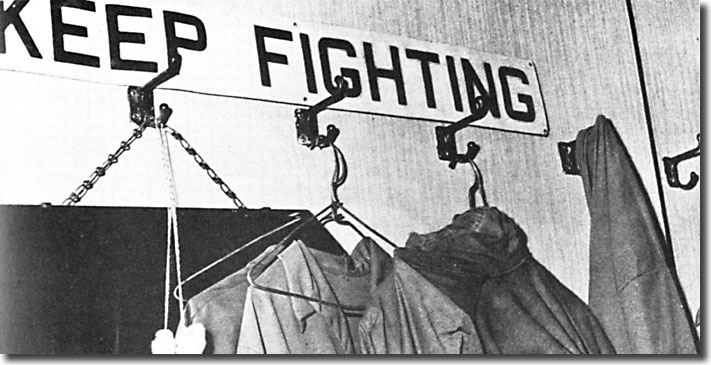 and
sheer, heart-stirring emotion ... We could not have done other than go
for that magical treble. Even if we did know that we were asking for a
miracle. You cannot be a winner every time out, but you have got to try
to win 'em all. And Leeds United's players made their manager a proud
man, even in the midst of disappointment.'
and
sheer, heart-stirring emotion ... We could not have done other than go
for that magical treble. Even if we did know that we were asking for a
miracle. You cannot be a winner every time out, but you have got to try
to win 'em all. And Leeds United's players made their manager a proud
man, even in the midst of disappointment.'
It had been the most extraordinary of seasons, one that has since assumed
legendary status for its glorious failures. They were, indeed, glorious:
this most magnificent of all football teams suffered cruel and undeserved
setbacks at the worst possible moments, but nevertheless they had tilted
at windmills in a manner that few footballers ever get the chance to do
and only went down, as all Revie's teams did, after giving it one hell
of a shot.
Part 1 - From ironclad defence to fluent attack
- Results and table
Other Football Highlights from 1969/70
- Arsenal produced a remarkable comeback on April 28 to end a long barren
spell that had not seen a trophy come to Highbury since the League championship
in 1953. The Gunners pulled a goal back five minutes from the end of
the first leg away to Anderlecht but still finished 3-1 losers. They
pulled off an astonishing 3-0 win in the second leg at Highbury to take
the trophy on a 4-3 aggregate score
- Manchester City enjoyed a third successive season of success, winning
both the League Cup and the Cup Winners' Cup. They beat West Brom 2-1
after extra-time in the League Cup final and Poland's Gornik Zabre by
the same score in the European final in Vienna
- Pele scored his 1,000th goal on November 20 when he converted a penalty
in Santos' 2-1 win over Vasco da Gama in Rio de Janeiro
- Tottenham and West Ham completed the first £200,000 transfer in Britain
when Martin Peters moved to Spurs in March and Jimmy Greaves joined
the Hammers in part-exchange
- After beating Leeds in the European Cup semi-finals, Celtic unexpectedly
lost 2-1 to Dutch side Feyenoord in the final. They also lost in the
Scottish Cup final, 3-1 to Aberdeen, but had the consolation of winning
the Scottish league and the League Cup for a fifth successive season
- Bobby Charlton captained England and scored a goal in his 100th international
match, against Northern Ireland at Wembley on 21 April
- UEFA decided to use penalty kicks, rather than the toss of a coin,
to decide tied matches in their three Cup competitions
- Some of the biggest names in English club football ended the season
with a brutal reminder that their glory days were long past. Preston
and Aston Villa, both previous Double winners, occupied the bottom two
places in the Second Division and were relegated - the first time that
both clubs had ever sunk so low. Sunderland and Sheffield Wednesday
were also in decline, slipping out of the First Division
- England's defence of the World Cup ended in disappointing fashion,
when they lost 3-2 to West Germany in the quarter-finals in Mexico after
taking a two-goal lead. They faced problems before the tournament when
captain Bobby Moore was arrested for theft in Colombia. Charges were
later dropped. They ran eventual winners Brazil closer than anyone and
were unlucky to lose 1-0. Gordon Banks' miracle save from a Pele header
was a highlight
- Brazil, inspired by Pele and featuring a remarkable forward line of
Jairzinho, Gerson, Tostao, Pele and Rivelino, proved themselves the
best team in the world with some outstanding performances and remarkable
goals in the rarefied atmosphere of Mexico. They thrashed Italy 4-1
in the final of a tournament, which was universally rated the best ever
back to top













 12
minutes remaining. From a corner Cooper swung a ball across the area and
Jones was unmarked as he nodded past keeper Millington. Even then, United
had to rely on a save from Sprake in the final minute to deny Evans.
12
minutes remaining. From a corner Cooper swung a ball across the area and
Jones was unmarked as he nodded past keeper Millington. Even then, United
had to rely on a save from Sprake in the final minute to deny Evans. test at Liverpool, while Everton visited Burnley. The Goodison men won
2-1, but Leeds had to be content with a goalless draw. The game turned
on two controversial incidents. United were relieved when referee Leo
Callaghan rejected penalty appeals after Cooper appeared to handle, but
were unhappy when the official blew for full time seconds before Madeley
got the ball in the net. The referee allowed no injury time despite at
least two lengthy stoppages.
test at Liverpool, while Everton visited Burnley. The Goodison men won
2-1, but Leeds had to be content with a goalless draw. The game turned
on two controversial incidents. United were relieved when referee Leo
Callaghan rejected penalty appeals after Cooper appeared to handle, but
were unhappy when the official blew for full time seconds before Madeley
got the ball in the net. The referee allowed no injury time despite at
least two lengthy stoppages. 'There
was no quarter anywhere and by the time the extra half hour had arrived
exhaustion and cramp were clearly making themselves felt. Law taking the
dark battlefield as substitute for Sartori who had run himself into the
ground - this six minutes into the extra period. Leeds followed suit with
Bates for Cooper who was carried away on a stretcher with 10 minutes still
left. Cooper may well be missing tomorrow night just as Ure of Manchester,
and Hunter of Leeds, were absent through injury on this occasion.
'There
was no quarter anywhere and by the time the extra half hour had arrived
exhaustion and cramp were clearly making themselves felt. Law taking the
dark battlefield as substitute for Sartori who had run himself into the
ground - this six minutes into the extra period. Leeds followed suit with
Bates for Cooper who was carried away on a stretcher with 10 minutes still
left. Cooper may well be missing tomorrow night just as Ure of Manchester,
and Hunter of Leeds, were absent through injury on this occasion. excellent best that Manchester could offer in their stride. Bremner sent
Manchester reeling with an eighth-minute goal and followed it with the
game of his life and he had had many a star game. His team responded to
a man. I have never seen a fine side, as Manchester have been this season
in five games against the champions, so taken apart by an even better
team. To watch a team with as many star players as Manchester have - five
of them are in the World Cup squad - so held in attack and sent so helter
skelter back in desperate defence was an experience.
excellent best that Manchester could offer in their stride. Bremner sent
Manchester reeling with an eighth-minute goal and followed it with the
game of his life and he had had many a star game. His team responded to
a man. I have never seen a fine side, as Manchester have been this season
in five games against the champions, so taken apart by an even better
team. To watch a team with as many star players as Manchester have - five
of them are in the World Cup squad - so held in attack and sent so helter
skelter back in desperate defence was an experience. Everton
dropping three points.
Everton
dropping three points. were
struggling especially hard as the season had been shortened. But it must
always be borne in mind that the League can, after all, forbid clubs to
take part in European competitions if they cannot fulfil commitments at
home.'
were
struggling especially hard as the season had been shortened. But it must
always be borne in mind that the League can, after all, forbid clubs to
take part in European competitions if they cannot fulfil commitments at
home.' only
beat six.'
only
beat six.' those two matches, but I'll never stop wondering what the result might
have been had we been fresher.'
those two matches, but I'll never stop wondering what the result might
have been had we been fresher.' public
sympathy.'
public
sympathy.' and
sheer, heart-stirring emotion ... We could not have done other than go
for that magical treble. Even if we did know that we were asking for a
miracle. You cannot be a winner every time out, but you have got to try
to win 'em all. And Leeds United's players made their manager a proud
man, even in the midst of disappointment.'
and
sheer, heart-stirring emotion ... We could not have done other than go
for that magical treble. Even if we did know that we were asking for a
miracle. You cannot be a winner every time out, but you have got to try
to win 'em all. And Leeds United's players made their manager a proud
man, even in the midst of disappointment.'